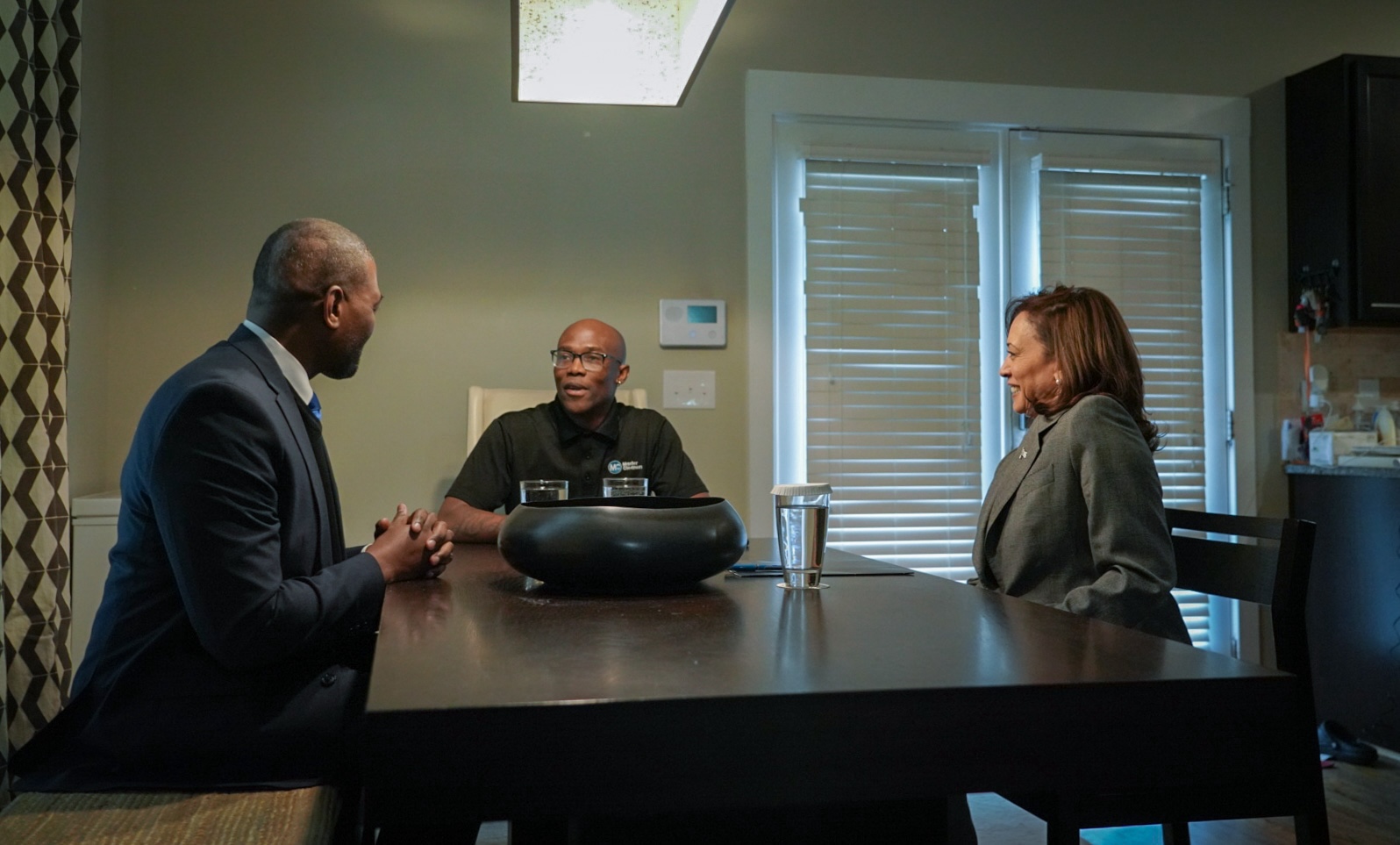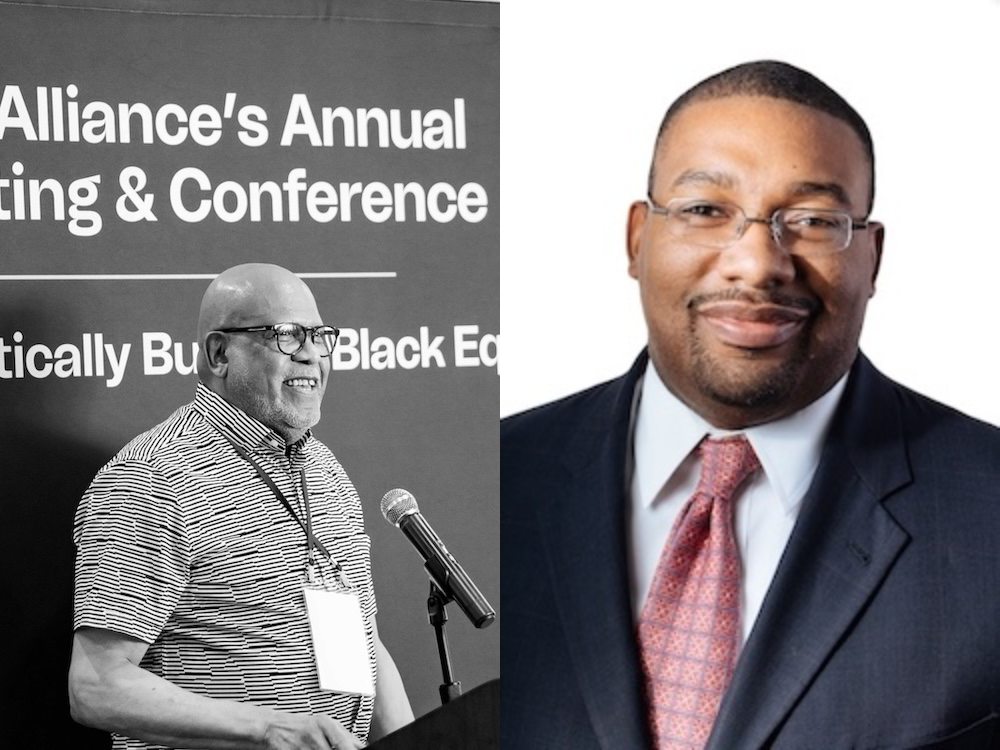
EPA Administrator Michael Regan announces the grant awards from the Greenhouse Gas Reduction Fund in Charlotte, North Carolina, on April 4. (Image: U.S. EPA via Flickr)
Low-income communities and communities of color across the United States faced health impacts from outsized air pollution for generations, and they're now among the first to feel the worst effects of climate change. On Thursday, the U.S. Environmental Protection Agency (EPA) announced $20 billion in grants aimed at righting these historic wrongs and ensuring communities actually benefit from growing sectors like clean energy.
Awardees include coalitions of nonprofit organizations, state and local agencies, and lenders like green banks and community development financial institutions (CDFIs). The projects they proposed will collectively avoid up to 40 million metric tons of greenhouse gas emissions per year, more than the annual emissions of Switzerland, Ireland and Denmark, while reducing air pollution and energy costs in their communities, according to the EPA.
Climate and economic justice advocates praised the EPA for its historic progress in mobilizing public and private capital within historically disadvantaged parts of the country. So, what's next for the winners, and how can business leaders, philanthropists and everyday people get involved?

Winners hit the ground running with EPA funds set to arrive in the coming months
Thursday's was an early but happy morning for Trenton Allen, CEO and founder of the financial advisory firm Sustainable Capital Advisors, who worked with organizations to prepare their applications for EPA funding. "I had a big smile when I saw the official news," Allen told TriplePundit by phone on Thursday. "I got up at 5 o'clock when the administration said they were going to release it to make sure I could see it live and in color."
A number of the organizations Allen's firm advised were ultimately selected — including the Ohio Air Quality Development Authority and the National Bankers Association, which advocates for minority deposit institutions (MDIs) that are majority-owned by people of color.
"Put into perspective that $20 billion have been allocated for the purpose of not just climate, but climate in our most underserved communities. That's huge," Allen said. "Whether organizations received money, didn't receive as much as they wanted to, or didn't get any at all, I think we all can collectively say that this amount of money — particularly for the benefit of communities across the country — is incredibly important, groundbreaking and transformational."
The awards were distributed under two separate grant competitions, the $14 billion National Clean Investment Fund and the $6 billion Clean Communities Investment Accelerator. The former looks to establish "national clean financing institutions" that deploy capital for clean technologies and energy efficiency at scale, while the latter will support community lenders working on the ground in historically disadvantaged communities.
"When you think about the United States' persistent wealth gap that harms many communities, and the societal and economic fabric of our nation as a whole, this investment will begin to enable many of those communities previously left out to help tackle climate change in their own backyards," said Lenwood V. Long Sr., CEO of the African American Alliance of CDFI CEOs, which represents 76 Black-led financial institutions.
The Alliance is a founding member of the Justice Climate Fund, a coalition of nearly 20 financial institutions led mostly by people of color and another of Allen's clients, which received nearly $1 billion through the Clean Communities Investment Accelerator.
In the coming weeks, groups like the Justice Climate Fund will work with the EPA to get contracts in place and ensure projects are aligned with the overarching objective of reducing emissions and air pollution. "We anticipate by June that money will be flowing to the Justice Climate Fund," Long said.
The CDFIs, MDIs, credit unions, and green banks in the Fund will deploy the grants to support projects like energy-efficiency upgrades, programs to expand heat pumps and other clean technologies that cut energy use and costs for residents, and electric vehicle charging stations for businesses and public places, Long said.
The coalition is already working to prepare member financial institutions for what's ahead. Today in Washington, D.C., the Alliance hosted an in-person and virtual workshop for members with the National Bankers Association, the National Association for Latino Community Asset Builders and Oweesta, which serves CDFIs led by Native American communities.
"We are not waiting until money starts flowing," Long said. "We have begun the process, as we have done before, of preparing our members for this awesome, historic, momentous opportunity."

"Now it's on us."
Following the announcement, awarded organizations will also begin the hard work of reassessing their planned projects in light of the funding they received. "I don't know what everyone asked for, but I'm pretty confident that no one got all the money they requested in their initial application," Allen said. "What that means is now you have to make some determinations and some adjustments with regard to your strategy."
Such work may necessitate tradeoffs, but it also creates opportunity for the winning organizations — and other stakeholders across the financial community — to work together to ensure funds are deployed to create the greatest impact possible.
"Because everyone got less money than what they originally asked for, we need to make sure we aren't duplicating services or duplicating efforts so that we can be as efficient as we can," Allen said. Early signs indicate the awardees have a healthy appetite for collaboration with each other to supplement and complement their work. "I've gotten signals that it’s something the winners want to do," Long added.
Beyond the awarded organizations, business leaders, financial professionals and the general public also have roles to play. "The administration created a program and has some clear goals and targets about what it's looking to achieve," Allen said. "I believe in their allocation of dollars, they've given themselves a chance to make that happen. Now it's on us to make sure it does happen."
That even includes conservative critics who lambasted the EPA grants as a “slush fund” doling out unrestricted billions to organizations without proven track records. "It's sad that any time there's something targeted for low-income and disadvantaged communities, people make it political, and it shows the racist and classist fight in America around economic justice and equity," Long said. "To all the pundits who say this is a pork barrel bill, this is money to organizations that don't have internal controls, join us in helping to make this work rather than sit on the sidelines and criticize and hope for failure. You ought to pray for success, because this money is going to all communities."
Despite rhetoric to the contrary, the EPA grant program has clear requirements: All projects must demonstrably reduce greenhouse gas emissions, and all awardees must report their progress publicly on an ongoing basis. "People need to understand that there's not a dime flowing to anyone who does not meet this litmus test of reducing carbon emissions," Long said.
The Joe Biden administration and the EPA also aim to multiply the grants provided under the $27 billion Greenhouse Gas Reduction Fund by attracting private capital — from businesses, financial institutions and philanthropists, as well as everyday people looking for climate-friendly investments and financial services.
"$20 billion is a lot of money, but it's not enough money," Allen said. "One of the things that these dollars have an opportunity to do is to help to animate, excite and allow communities to see how they can best participate. I am really hopeful about how these dollars can lead to a transformation that this country has not seen as it comes to climate, but also economic opportunity and economic development."
Long agreed, saying that while much work is left to do, the way funds were allocated represents a monumental step forward. "This is the only program I've seen where you take $15 billion of the $27 billion and those funds are targeted for low-income and disadvantaged communities," he said. "I'm looking at institutions around America that are preparing for this moment. Here in my state, North Carolina, the community college system has a program around EV charging stations for students and entrepreneurs. They know what's coming."

Mary has reported on sustainability and social impact for over a decade and now serves as executive editor of TriplePundit. She is also the general manager of TriplePundit's Brand Studio, which has worked with dozens of organizations on sustainability storytelling, and VP of content for TriplePundit's parent company 3BL.













